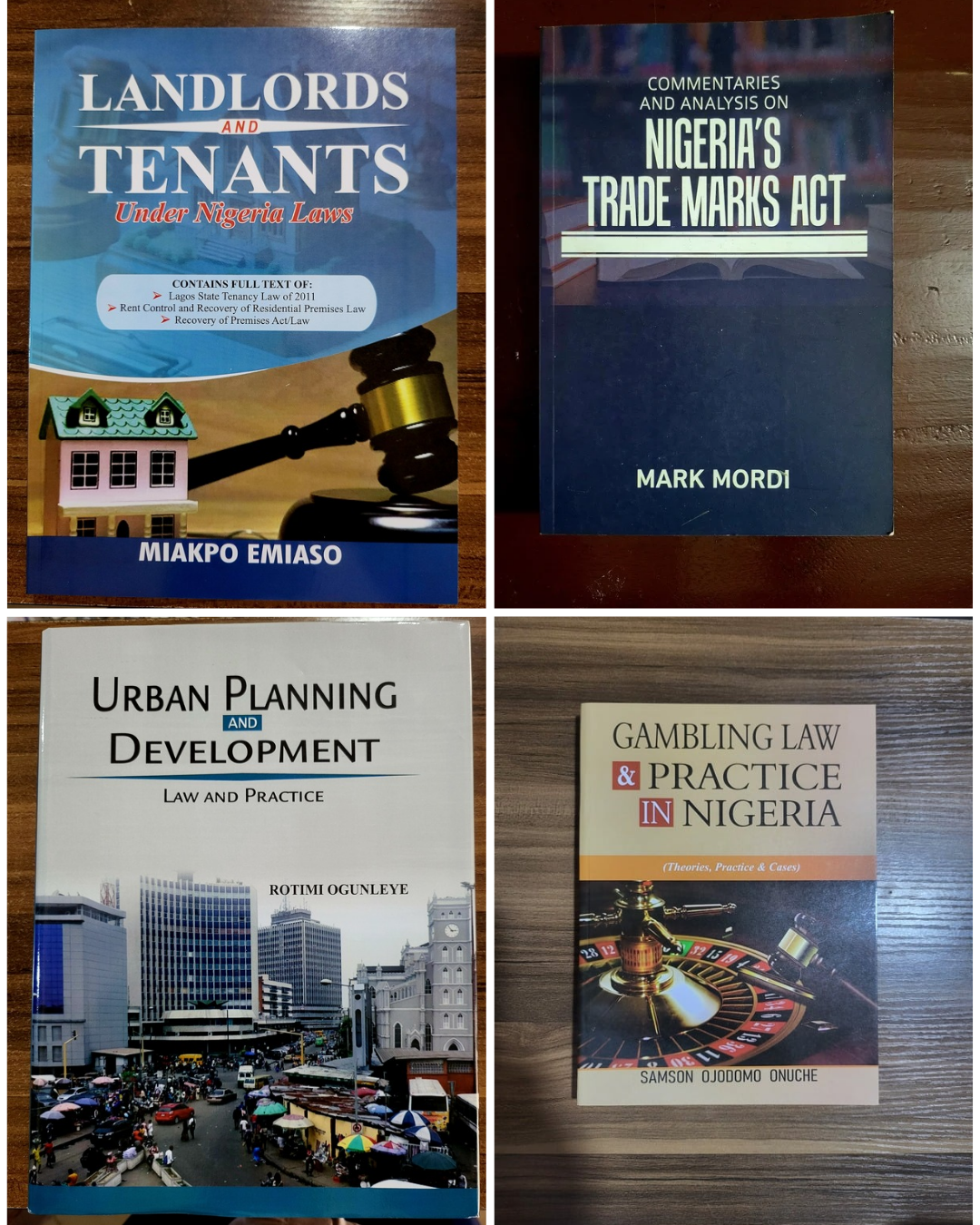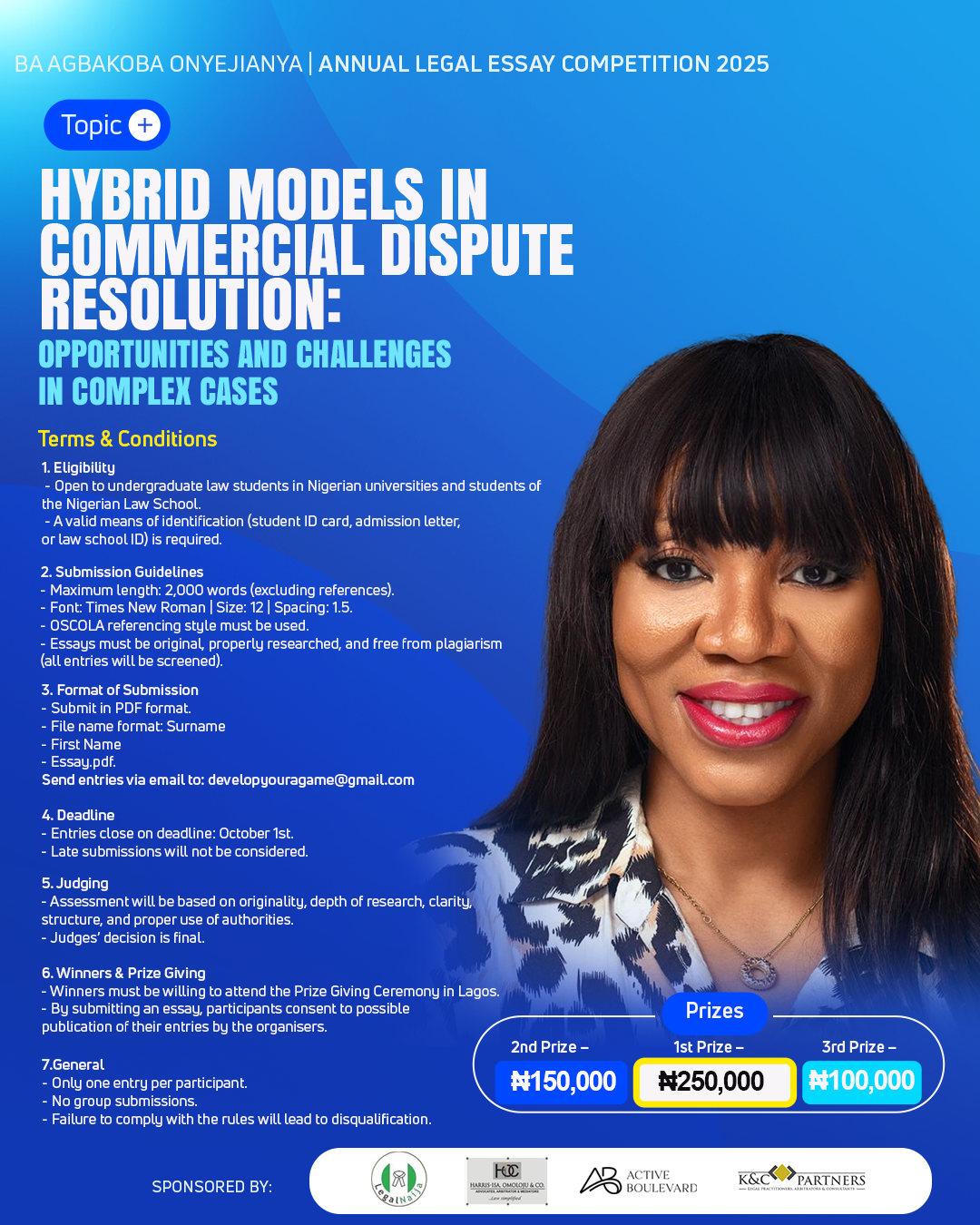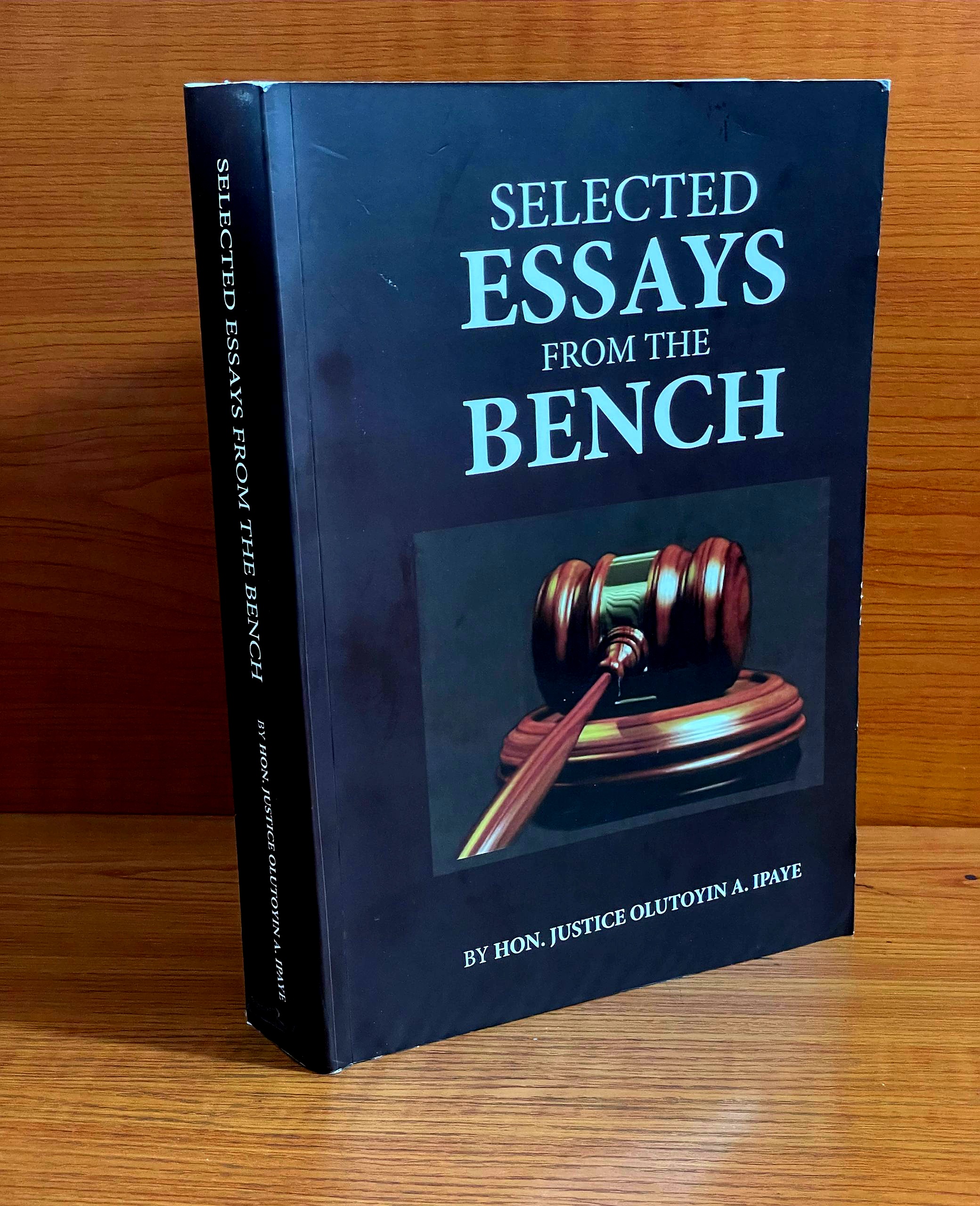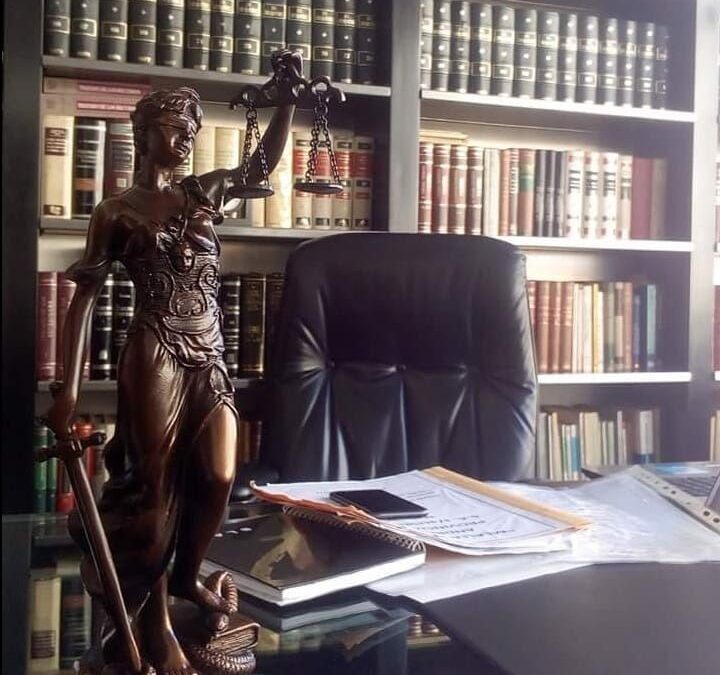
A Constitutional Critique Of Section 84 Sheriff And Civil Process Act | Nonso Obiadazie
Colonial Shackles on Justice Delivery: A Constitutional Critique Of Section 84 Sherrif & Civil Process Act Through The Lens of Central Bank of Nigeria v. Inalegwu Frankline Ochife & 3 Ors (2025) LPELR-80220 (SC) by Nonso Obiadazie Esq.
Introduction
Enforcement of court judgment is an important part of our adversarial system of adjudication. Upon the final determination of a case resulting in a monetary judgment, it is the duty of the successful party (“judgment creditor”) to initiate enforcement proceedings to compel compliance of the judgment. One of the ways to achieve this is through garnishee proceedings. This type of judgment enforcement mechanism allows the judgment creditor to seize funds held by third parties (usually financial institutions) on behalf of the unsuccessful party (“judgment debtor”). This is necessary because the adversarial nature of our legal system does not ensure the automatic satisfaction of a judgment debt. Enforcing a monetary judgment against a private person usually presents little difficulty. The judgment creditor can easily proceed against third parties who hold funds on behalf of that private person and can recover the judgment sum without needing his consent.[1] However, the case is different where the judgment debtor is the Government or any of its agencies, as Section 84 of the Sheriffs and Civil Process Act (“SCPA”) imposes a statutory requirement for obtaining prior consent from the Attorney General of the Federation or of a State before enforcement proceedings can be initiated by the judgment creditor. This requirement traces back to a colonial-era doctrine which held that the “Crown could do no wrong”.
Under this doctrine, it was necessary to seek and obtain the Crown’s consent before suing or enforcing a judgment against it. Despite Nigeria’s independence from colonial rule and the constitutional mandate requiring that court decisions be enforced against all authorities and individuals without the need for prior consent,[2] this colonial doctrine, preserved through statutory provisions, continues to hold sway in our legal system. Thus, this article will examine the constitutionality of Section 84 of SCPA, with a critical analysis of the recent Supreme Court’s decision in Central Bank of Nigeria v. Inalegwu Frankline Ochife & 3 Ors, paying particular attention to the dissenting opinion delivered by His Lordship, Hon. Justice Helen Ogunwimiju, JSC. The case has become a focal point for reassessing whether such colonial doctrine can coexist with Nigeria’s constitutional order founded on justice, democracy and separation of powers.
2.0 Colonial History of Section 84 of the Sheriffs and Civil Process Act
The provision was first introduced in Nigeria as the Sheriffs and Civil Process Ordinance of 1st June 1945. In the lead-up to Nigeria’s independence, it was incorporated into the Laws of the Federation of Nigeria and Lagos, 1958.[3] Following independence in 1960, the Ordinance was preserved as an existing law pursuant to the 1960,[4] 1963,[5] 1979,[6] and 1999[7] Constitutions of the Federal Republic of Nigeria. It provides as follows:
“84. (1) Where money liable to be attached by garnishee proceedings is in the custody or under the control of a public officer in his official capacity or in custodia legis, the order nisi shall not be made under the provisions of the last preceding section unless consent to such attachment is first obtained from the appropriate officer in the case of money in the custody or control of a public officer or of the court in the case of money in custodia legis, as the case may be.
(2) In such cases the order of notice must be served on such public officer or on the registrar of the court, as the case may be.
(3) In this section, “appropriate officer” means-
(a) in relation to money which is in the custody of a public officer who holds a public office in the public service of the Federation, the Attorney-General of the Federation;
(b) in relation to money which is in the custody of a public officer who holds a public office in the public service of the State, the Attorney-General of the State.”
Where money liable to be attached by garnishee proceedings is in the custody or under the control of a public officer in his official capacity or in custodia legis, the order nisi shall not be made under the provisions of the last preceding section unless consent to such attachment is first obtained from the appropriate officer in the case of money in the custody or control of a public officer or of the court in the case of money in custodia legis, as the case may be.
The provision is to the effect that where a person obtains a monetary judgment, and the funds to be attached or seized are in the custody of a public officer, the person as a judgment creditor is prohibited from attaching such funds, unless prior consent is obtained from the Attorney General of the Federation or of a State, as the “appropriate officer”. In this context, where the government or any of its agencies is a judgment debtor in a monetary judgment, the judgment creditor cannot initiate enforcement proceedings against the Central Bank of Nigeria without first obtaining prior consent. Such consent must be sought and obtained before the court can entertain any enforcement proceedings brought by the judgment creditor.

Order at www.legalnaija.com/bookstore
It is our view that Section 84 of SCPA is a relic of colonial legal doctrine, rooted in the principle of “rex non potest peccare” which means that the Crown—or the State—could do no wrong. This English doctrine is also known as “sovereign immunity” and it means that the Crown/State could not be sued for any wrongdoing, nor could a judgment be enforced against it. Yousufi argues that the reason for the immunity of crown is not because of the feeling that the crown is above the law, but because there was no court above the court of the crown.[8] As a result of this legal barrier, people needed a legal workaround to enable individuals to seek redress against the Crown in court. This led to the enactment of the Petition of Rights Act in 1860 and Section 4 of SCPA in 1945 by the English authorities. Both legislations provided a statutory framework through which individuals could submit a petition of rights to the Crown, seeking its consent to sue or enforce a judgment against it. Nigeria by colonial affiliations inherited these legal traditions from the British and it became part of our laws upon independence in 1960.[9] The applicability of these statutes in Nigeria was judicially affirmed in the landmark case of Ransome-Kuti & Ors v. Attorney-General of the Federation.[10] In this case, the home of a famous Afrobeat musician, Fela Kuti, was invaded in 1977 by soldiers following an earlier clash with his staffs. The soldiers, numbering over One thousand (1000), forcibly entered Fela’s home by dismantling the wire fencing. They proceeded to eject all occupants from the house, with the exception of Fela’s mother and brother. Subsequently, the soldiers moved to the main residential building, which they deliberately set on fire. They instituted an action against the Federal Government, seeking to hold it vicariously liable for the wrongful acts of its soldiers. The Federal Government relied on the defence of rex non potest peccare, contending that it was immune from suit and that the claim was incompetent, as the Claimants had failed to obtain the requisite consent of the Attorney-General of the Federation under the Petition of Rights Act before commencing the action. The trial court, on that basis, dismissed the suit. The Claimants appealed to the Court of Appeal, which also dismissed the appeal. Dissatisfied, they further appealed to the Supreme Court, which, in upholding the principle of Crown immunity, held as follows, per Karibi-Whyte, JSC:
“The infallibility of the State which clothes it with immunity for wrongs committed on is behalf is still with us. Since the theory that public revenue cannot be made liable to remedy wrongs committed by servants of the State without its consent is the governing consideration, it requires a revolutionary amendment of the law to render the State liable for wrongs committed by its representative servants. Until this is done the common law remains applicable.”[11]
The Supreme Court did not hesitate to dismiss the appeal, citing state immunity and the appellants’ failure to obtain the state’s consent as required by Petition of Rights Act. However, the Court also suggested a revolutionary legal amendment to make the state liable for its wrongs. This suggestion was later adopted in the 1979 Constitution, which removed the requirement to obtain state consent before suing the government. This was judicially affirmed in the case of Government of Imo State v. Greeco Construction & Engineering Ltd.[12] The Respondent sued the Appellants for the balance of N20, 979.80 (Twenty Thousand, Nine Hundred and Seventy-Nine Naira, Eighty Kobo), due in respect of a contract agreement entered into by both parties for the building of residential quarter for lawmakers. The contract was duly performed but the Appellants refused to pay the balance claimed . The Appellants, as in the Ransome-Kuti case, argued that the State Government was immune from a law suit and that the Respondent had failed to obtain the Imo State Government’s consent, as required under Sections 4 and 5 of the Petition of Rights Law, before initiating the action. The trial court entered judgment in favor of the Respondent. Dissatisfied with the decision, the Appellants appealed to the Court of Appeal. Upon review, the Court of Appeal held that the provision of the Petition of Rights Law requiring prior consent to initiate lawsuits against the government was unconstitutional, as stated in the following terms, per Olatawura, J.C.A:
“The right to refuse the fiat under section 5 of the petitions of Right Law is final and conclusive. There is no provisions for redress once the fiat is refused. In other words, a citizen who conies by way of the Petitions of Right Law and is refused the fiat of the Governor is without remedy. The refusal is “final and conclusive.” Consequently, he is denied access to the court. This will be contrary to section 6(6)(b) of the 1979 Constitution which provides:
“6. The judicial powers vested in accordance with the foregoing provisions of this section.
(b) shall extend to all matters between persons, or between government or authority and any person in Nigeria, and to all actions and proceedings relating thereto, for the determination of any question as to the civil rights and obligations of that person.”[13]
It is important to note that although the requirement to obtain the State’s consent before initiating legal action has been abrogated by both constitutional provisions and judicial pronouncements, however, the second limb of the Crown immunity doctrine—requiring consent before enforcing a court judgment against the State under Section 84 of SCPA—remains intact. This aspect has not yet been judicially invalidated, despite constitutional provisions that arguably support its abolition.
3.0 Ogunwumiju JSC’s Judicial Activism in CBN v. Frankline Ochife & Ors: Upholding Unrestricted Judgment Enforcement Under the 1999 Constitution
The concept of judicial activism is not new to our jurisprudence and has no straight-jacket definition. Its usage depends on the user’s context particularly in relation to the role of the judiciary within a constitutional democracy. However, according to Peter Russell, “judicial activism is the judicial readiness in enforcing constitutional limitations on the other branches of government.”[14] His Lordship, Ogunwumiju JSC, exemplified this stance in Frankline Ochife’s case, where His Lordship took a bold step in enforcing an unrestricted judgment enforcement under the 1999 Constitution, thereby affirming the constitutional limits of executive authority over judicial decisions. As previously stated, the requirement to obtain the Attorney General’s consent before enforcing a judgment against the State is part of the broader colonial Crown immunity doctrine, which requires consent both in initiating legal action and enforcing judgments against the State. While the requirement to obtain consent to sue the State has been invalidated through constitutional[15] and judicial[16] pronouncements, the requirement to obtain consent before enforcing a judgment, particularly monetary judgments, remains operative, despite constitutional provisions to the contrary. In our view, this requirement is inconsistent with the Constitution, specifically Section 287, which guarantees unrestricted enforcement of judicial decisions. Section 287 provides as follows:
“(1) The decisions of the Supreme court shall be enforced in any part of the Federation by all authorities and persons, and by courts with subordinate jurisdiction to that of the Supreme Court.
(2) The decisions of the Court of Appeal shall be enforced in any part of the Federation by all authorities and persons, and by courts with subordinate jurisdiction to that of the Court of Appeal.
(3) The decisions of the Federal High Court, National Industrial Court, a High Court and of all other courts established by this Constitution shall be enforced in any part of the Federation by all authorities and persons, and by other courts of law with subordinate jurisdiction to that of the Federal High Court, National Industrial Court, a High Court and those other courts, respectively.”
The provision imposes a binding obligation on all persons and authorities to comply with decisions of courts. This obligation is absolute, subject only to the right of appeal. It also embodies two critical principles: first, it affirms the supremacy of judicial decisions; and second, it eliminates any discretionary power in the enforcement of such decisions, ensuring that compliance is mandatory and non-negotiable. It is submitted that the supremacy of judicial decisions is absolute, particularly within Nigeria’s federal system of government, where the Constitution stands as the supreme law of the land. Consequently, any law that conflicts with the provisions of the Constitution, such as Section 84 of SCPA, must defer to it.[17] However, despite this explicit constitutional mandate, Nigerian courts (Court of Appeal) still continue to apply Section 84 of SCPA.[18] The continued application has led to grave injustice, as parties who have endured the stressful process of litigating against the government are still compelled to seek its consent before enforcing a judgment—thus allowing the State to act as both adversary and gatekeeper to justice. This is unacceptable.
In January 2025, the Supreme Court was presented with a sweet opportunity to interpret Section 84 of SCPA in light of Section 287 of the 1999 Constitution in Frankline Ochife’s case (supra). However, the Court ignored its interpretative role and relied instead on procedural technicalities in dismissing the appeal. But, Ogunwumiju, JSC, in a powerful and well-reasoned dissent which we endorse effectively dismantled the last colonial remnants of the crown immunity doctrine and reaffirmed the supremacy of our Constitution. The facts of the case is simple. The 1st Respondent obtained a judgment in the sum of ₦50 million against the Inspector General of Police (IGP), the Commissioner of Police, FCT (COP), and the Special Anti-Robbery Squad (SARS) of the Nigeria Police Force. Following the judgment, the 1st Respondent initiated garnishee proceedings to recover the judgment sum. Upon being served with the Order Nisi, the Appellant filed an affidavit to show cause, asserting that the IGP, COP, and SARS did not maintain any account with the Central Bank of Nigeria (CBN). The trial court, however, disregarded the affidavit and proceeded to make the Order Nisi absolute against the Appellant. Dissatisfied with the decision, the Appellant appealed to the Court of Appeal, which dismissed the appeal. On further appeal to the Supreme Court, the Appellant raised the issue that the 1st Respondent had failed to seek and obtain the consent of the Attorney General of the Federation under section 84 SCPA before initiating the garnishee proceedings, thereby rendering the trial court without jurisdiction to entertain the suit. The Supreme Court, in a 4-1 decision, held that the issue of consent was not raised at the trial court and, as such, could not be raised for the first time on appeal. The Court further held that the failure to obtain consent constituted a procedural irregularity, which the Appellant had waived by not raising it earlier at the trial court. The majority decision of the Supreme Court made no attempt to interrogate the constitutionality of Section 84 of SCPA. In contrast, the dissenting opinion of Ogunwumiju, JSC stood as a lone voice of judicial activism. His Lordship used two key points in dismantling Section 84 SCPA. The first was a historical analysis. His Lordship observed that Section 287 of the 1999 Constitution was a product of Section 251 of the 1979 Constitution, both of which affirmed the binding and unrestrictive nature of judicial decisions. To constitutionalize Section 84 of the SCPA, the Military Government promulgated Decree No. 107, by inserting Section 84 under Section 251(4) of the 1979 Constitution. It provides as follows:
“(4). Notwithstanding the provisions of this section, no person shall enforce a judgment against a ministry or extra-ministerial department without the fiat of the Attorney General of the Federation or the Attorney General of a State, whether or not he was, in either case, a party to the proceedings.”
This legislative move, according to Her Lordship, was an implied admission by the Military Government that Section 84, standing alone, lacked constitutional validity. Given that the drafters of the 1999 Constitution deliberately omitted the above provision in the extant 1999 Constitution, Section 84 SCPA cannot stand independently without conflicting with it. It was held as follows:
“In my view, if Section 84 of the S & CPA had existed since 1945 and Decree 107 was promulgated in order to give it constitutional flavour by incorporating it as Section 251(4) of the 1979 Constitution in 1993 by the Military Junta, the law makers definitely did so because they recognised the point that Section 84 of the S & CPA (on its own) was not only inferior to the 1979 Constitution but also in conflict with it. It is therefore my view that standing on its own as it is today, and not being made a provision of the 1999 Constitution, it cannot be validly argued that it is not in conflict with the constitution.”[19]
The second point was the doctrine of separation of powers between the executive and the judiciary. His Lordship emphasized that this principle safeguards each branch of government from encroaching on the functions of the others. He further observed that nowhere in the 1999 Constitution is the authority of the judiciary subordinate to that of the executive. It was held as follows:
“It is trite that separation of power is a constitutional principle introduced to ensure that the three major institutions of the state, namely the legislative, executive and the judiciary are not concentrated in one single body whether in function, personnel or powers. This division ensures that powers of each branch of government are not in conflict with others. The intention behind a system of separated powers is to prevent the concentration of powers by providing for checks and balances. This has been meticulously done in the 1999 constitution (as altered). Nowhere in the 1999 constitution (as altered) have the powers of the judiciary been made subject to the power of the executive.”[20]
His Lordship’s analysis is both compelling and unassailable, and we are in full agreement with its reasoning. One can readily see that Section 84 of the SCPA amounts, at worst, to an unlawful delegation of judicial power, and at best, to sharing judicial authority with a person or body outside the judiciary, thereby undermining the exclusive constitutional role of the courts. It appears that other Justices on the panel overlooked the fact that vesting the Attorney General with the discretion of obeying or not obeying a valid court judgment constitutes a serious affront to the integrity of our constitutional democracy. It weakens the very essence of judicial authority and access to justice. It is unfair that a judgment creditor, having endured the rigors of litigation against the government or its agencies, must then seek the consent of the very adversary to enforce a judgment lawfully obtained. Such a provision erodes public confidence in the rule of law. One of the reasons for its application is that it is an administrative procedure to safeguard the government from embarrassment.[21]
Now, the questions that naturally arise are: What becomes of a judgment creditor if the Attorney General refuses to grant consent? Does the judgment creditor simply walk away empty-handed? We are not unmindful of the fact that in CBN v. Interstella Communications Ltd & Ors,[22] the Supreme Court made an exception to the consent requirement by holding that where the Attorney General is the judgment debtor, consent becomes irrelevant. However, this exception is not enough to safeguard the integrity and supremacy of judicial decisions from executive interference. In our view, if this provision remains in force, monetary judgments against the government will be rendered practically useless in Nigeria. It is our view, that although Ogunwumiju JSC’s opinion did not form the majority decision, it establishes a foundation for the potential judicial invalidation of Section 84 of the SCPA—an approach that may well be adopted in future cases.

4.0 THE WAY FORWARD
4.1 Repealing or Amending Section 84 SCPA
In our considered view, the requirement of obtaining consent to enforce a monetary judgment has long outlived its usefulness and should be repealed by the National Assembly. In the alternative, it ought to be amended to require mere notice rather than consent. Notably, other jurisdictions with the same colonial histories—such as Ghana, Kenya, and India do not have any provision equivalent to Section 84 of SCPA. Even the United Kingdom, from where Nigeria inherited the doctrine, abolished such restrictions by the Crown Proceedings Act of 1947. Yet, Nigeria continues to apply this outdated doctrine, to the detriment of judicial authority and access to justice. Legislative action is needed to remove this problem and ensure that successful litigants can enforce monetary judgments against the government without restrictions.
4.2 Judicial Activism
Judges must embrace judicial activism when the circumstances demand it. They should not remain passive in the face of a law that conflicts with constitutional provisions, given the legislative inaction since its enactment in 1945. Judicial activism is not foreign to our legal system; it is firmly rooted in our corpus juris.[23] Indeed, it was through judicial activism that the Supreme Court of India was able to abolish the colonial doctrine that “the Crown can do no wrong” in Maneka Gandhi v. Union of India.[24] It is therefore imperative to allow space for judicial activism, as it can drive the growth of Nigerian law and open new frontiers in our legal system. As Lord Denning aptly observed in Packer v. Packer,[25] “If we never do anything which has not been done before, we shall never get anywhere. The law will stand still while the rest of the world goes on, and this will be bad for the law.” Sadly, in this regard, Nigerian law has remained stagnant since 1945, while the rest of the world has moved forward.
5.0 CONCLUSION
The harmful effects of the consent requirement on enforcing monetary judgments against the government are well-known and need no rehashing. We therefore restate our position that this requirement has outlived its usefulness, as Nigeria is no longer under colonial rule. Our current Constitution has clearly abolished such a practice, and it should therefore cease to be applied since it serves as a shackle on justice delivery. Nigerian courts, including the Supreme Court, have a duty to ensure that their future decisions on this subject matter should uphold the supremacy of the Constitution over any inferior or colonial-era law, which has contributed nothing positive to the development of the nation’s legal system.
[1] Sherrif and Civil Process Act, S. 83.
[2] Constitution of the Federal Republic of Nigeria 1999 (as amended), S. 287.
[3] Cap. 189 LFN 1958.
[4] Section 155.
[5] Section 156.
[6] Section 274.
[7] Section 315.
[8] Musab Yousufi “The Application of Legal Maxim “King Can Do No Wrong” In the Constitutional Law of UK & USA: An Analytical Study” Global Legal Studies Review V(II) (2020) page 2.
[9] Interpretation Act, S. 45.
[10] (1985) 2 NWLR (Pt. 6) 211.
[11] Page 253, para B-C.
[12] (1985) 3 NWLR (Pt. 11) 71.
[13] Page 79, para B-C.
[14] Ibrahim Imam, “Judicial Activism in Nigeria: Delineating the Extent of Legislative-Judicial Engagement in Law Making” (2015) 15 International and Comparative Law Review 114.
[15] Constitution of the Federal Republic of Nigeria 1999 (as amended), S. 6(6)(b).
[16] Government of Imo State v. Greeco Construction & Engineering Ltd (Supra).
[17] Constitution of the Federal Republic of Nigeria 1999 (as amended), S. 1(3).
[18] See Onjewu v. Kogi State Ministry of Commerce & Industry (2003) 10 NWLR (Pt. 827)40; Government of Akwa Ibom State v. Powercom Nig. Ltd (2004) 6 NWLR (Pt. 868) 202 and C.B.N. v. Hydro Air PTY Ltd. (2014) 16 NWLR (Pt. 1434) 482.
[19] Page 148.
[20] Pages 152.
[21] See C.B.N. v. Hydro Air PTY Ltd. (supra).
[22] See (2018) 7 NWLR (Pt. 1618) 294.
[23] See Adegbenro v. Akintola(1963) All NLR 305, Akintola v. Adegbenro (1962) 1 All NLR 442, Williams v. Majekodunmi (1963) 2 SCNLR 26, Council of University of Ibadan v. Adamolekun (1967) NSCC 210, and Lakanmi v. Attorney General of Western Nigeria (1970) NSCC 143.
[24] 1978 AIR 597.
[25] 80 KG pg 226.




 Adedapomola G. Lawal, Esq
Adedapomola G. Lawal, Esq